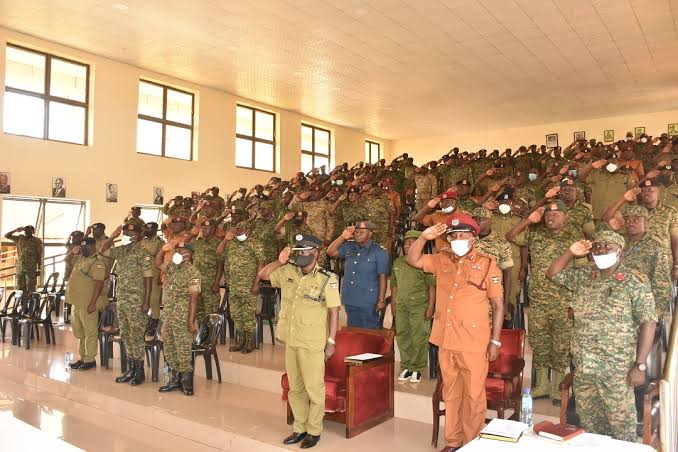Today, October 9, 2024, Uganda is celebrating its 62nd Independence Day anniversary at Busiko Teachers’ Training College in Masafu Town Council in Busia district.
This historic event will be celebrated with an array of milestones and testimonies that highlight Uganda’s independence journey from 1962 to date.
Since 1962, Uganda’s security has tackled various crime waves; these have been solved through a series of enhancements in security. The security of Uganda has greatly improved compared to the times before independence and even after, when we had to go through regimes like that of Amin Dada that led to mass killings. However, when one looks back, the security of Uganda has evolved significantly.
Crime Statistics
The Uganda Police Force has positively been able to combat crime, and according to the annual crime report of 2023, there has been a 1.5% decrease in the number of crimes reported to police compared to 2022, where there was an increase in crime of 18%. Cases have reduced from 231,653 cases reported in 2022 to 228,074 cases in 2023.
Police attributed the reduction of crime volumes to coordination amongst sister agencies, intelligence and reorganization of the Criminal Investigations Directorate, and improved detection and investigation methods.
Community policing
In 2005, under the leadership of President Yoweri Museveni and former Inspector General of Police, Gen. Kale Kayihura, the Uganda Police Force embraced community policing, based on the concept that police officers and private citizens work together to solve contemporary community problems related to crime, social and physical disorder, and neighborhood decay.
Joint Security Operations
Joint initiatives by the Uganda Peoples Defense Force, Uganda Prisons, Special Forces Command, Joint Intelligence Committee, Case Management and Intelligence System, Internal Security Organization, Crime Intelligence, and External Security Organization), and Joint Anti-Terrorism Taskforce have resulted in the reduction of various crimes, including gun-related crimes, terrorism, and gang activities in various districts like Kampala, Karamoja, Masaka, and many others.
The implementation of sub-county policing
This model of policing was introduced mainly in sub-counties that have a higher crime rate, namely Greater Masaka, in the form of call response centers and the expansion of motorcycle squads, which have contributed to a more visible and effective police presence across the country.
Improvement in detention facilities
Significant efforts were made to improve conditions in detention facilities, with the remodeling of 10 facilities in districts like Panyadoli, Kiryandongo, Paidha, Maracha, Yumbe, Atiak, and Kololo, leading to the elimination of outdated systems such as the soil bucket system, which most of these facilities used before independence, hence providing 68% coverage of waterborne toilets.
Improvements in Police Administration
The Uganda Police Force has undergone significant administrative changes since 2006, from only four Directorates that run the affairs of the Force to the current 20 directorates, namely; Human Resources Management or Administration, Operations, Crime investigations and Intelligence, Interpol and International Relations, Logistics and Engineering, Welfare and Production, Counter Terrorism, Research, Planning and Development, Oil and Gas, Political Commissariat, Information Communication and Technology, Health Services, Traffic and Road Safety, Fire Prevention and Rescue Services, Human Rights and Legal Services, Parliamentary Affairs, Kampala Metropolitan, Special Duties, Field Force Police and Forensic services.
Each of these directorates is tasked with various duties in the force, leading to crime reduction, which was not the case before independence.
Introduction of disciplinary courts within the force
These courts have made a significant milestone within the force in ensuring that officers adhere to professional standards and human rights.
According to statistics, out of 933 complaints of human rights violations by the police, 794 were thoroughly investigated, demonstrating a commitment to accountability and transparency.
International Peacekeeping Contributions
The Uganda People’s Defense Forces has actively participated in sending troops for peacekeeping in other foreign countries on the request of the United Nations and African Union. The Force has sent troops to Liberia, Kosovo, Darfur, South Sudan, East Timor, and currently Somalia. In all these places, soldiers have excelled in their work and discipline.
The security in Uganda has extended even to other countries.
However, despite all these positive milestones, the security apparatus in Uganda has faced a lot of criticism from the population for corruption, human rights violations, wrongful arrests, and operational inefficiencies.
Nonetheless, there is still room for improvement by all security personnel, and also their general welfare should be enhanced by the government through salary increments, improved shelter, trainings, and capacity building, to mention but a few.
